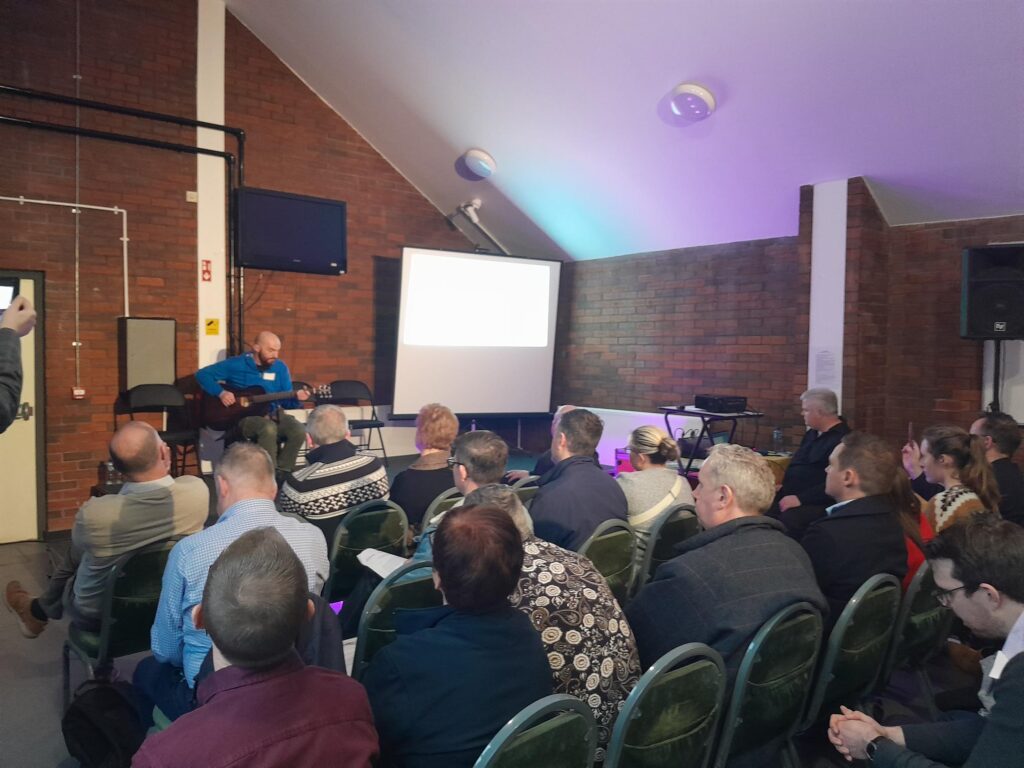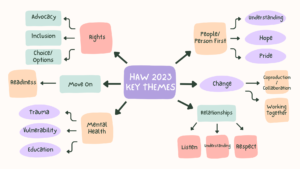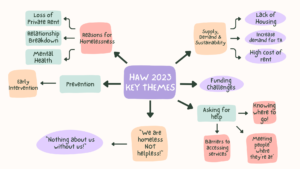
To mark Homelessness Awareness Week #HAW2023, HarmonI hosted a discussion event bringing together a range of stakeholder and those with lived experience to find common ground on how we can #turnthetide of homelessness in Northern Ireland.
The aim of the event was to start a discussion between individuals and organisations, to try and collectively find a way to end homelessness.
It was important for the event to recognise different perspectives and experiences of homelessness and the homeless services or ‘system’. In this way the event aimed to bring together 3 key points of view: a service provider view; a lived experience view; and a funder/policy maker view. As well as having these key perspectives represented in the audience, it was important to have those voices represented on the discussion panel, and as such the following individuals shared their knowledge and expertise on the topic of homelessness:
The event was hosted by Gerry Skelton MBE and Senior Lecturer in Social Work at Belfast Met. Gerry also shared his insights and expertise into the topic.
During the course of the event key themes and discussion points were recorded, these themes can be observed on the mind map below. The themes were further grouped into systemic themes and individual themes and explored in greater detail.


Systemic Themes:
Several themes or factors were mentioned during the course of the event from a range of different perspectives, many of these themes could be grouped under the category of system or systemic factors. One of these such factors concerns the increased number of people experiencing homelessness and the subsequent demand and lack of supply of temporary accommodation. The use of non-standard accommodation and the ineffective use of public funds on this was also discussed.
Similarly, the ‘fire fighting’ and focus on crisis intervention also brought up the argument of not enough money being set aside for homelessness prevention and early intervention activities. Overall, the lack of funding and rising costs to services means sees the we will continue to see a focus on crisis response, particularly when considering the growing amount of household presenting as homeless. More funds need to be invested in both sides of the equation to solve the issue of homelessness.
In addition, the lack of social housing in combination with the reduction in private rentals on the market and increased rent costs, means people currently experiencing homelessness are finding it increasingly difficult to exit homelessness, meaning many households experience extended periods (sometimes even years) in temporary accommodation. Moreover this lack of ‘move on’ means TA becomes silted up, further contributing to the problem of the lack supply of TA and use of non-standard accommodation.
Another systemic issue which was discussed on the day surrounds barriers to accessing help and services. Often people do not know where to go or who to approach to ask for help in the first instance and when they do, often they face barriers of eligibility criteria. An example of this which was mentioned at the event was barriers to accessing a GP with no fixed address and being unable to avail of mental health support due to the individual actively using substances.
The last key systemic theme which emerged during discussion surrounded coproduction, collaboration and working together. Homelessness is not an issue which can be addressed by any one party, organisation or individual, we need to work collaboratively to find appropriate solutions to the issue, coproducing policy and service responses with those who actively use and access the services.
Individual Level Themes:
In terms of individual level themes, one factor which was cited by a number of participants on the day was pride and stigma. With there still being existing stigma (further perpetrated by mainstream and social media) surrounding homelessness in the general population, it can be difficult for people to reach out and ask for help. This is further compounded by an individuals ‘pride’. Although previous campaigns have done great work to combat negative stigma, more work needs to be done to educate the general public and to ‘stamp out’ these perceptions and misconceptions surrounding people experiencing homelessness.
In regards to what helps and works when supporting people experiencing homelessness three key themes came out above all: understanding; choice and respect. It was clear that these are factors in which a positive supporting relationship is built on. The importance of listening was also emphasised; just being present, non-judgmental and listening to an individual, their needs and wants.
The last individual level theme concerned hope. Homelessness is a traumatic for anyone who experiences it. Not having your most basic need of housing met fundamentally impacts every aspect of life. With the worsening ‘wider picture’ it can be difficult to see the ‘light at the end of the tunnel’, but there is hope and there are people who do want to help. So lets focus on building on the good!
Reflecting on the discussion event, it was clear that the aim to bring together different perspectives and to find common ground was achieved. But it does not end here. As previously mentioned this event looked to ‘start a discussion’, now having achieved this, we must continue the discussion and explore some the these themes in greater detail, thinking about how we can better respond collaboratively to homelessness in Northern Ireland.
HarmonI want to say a big thank you to all those who helped in the organisation and running of the event, especially to all our panel members. We would also like to extend our thanks to all those who attended the event on the day. We look forward to more discussions and collaboration in the near future.